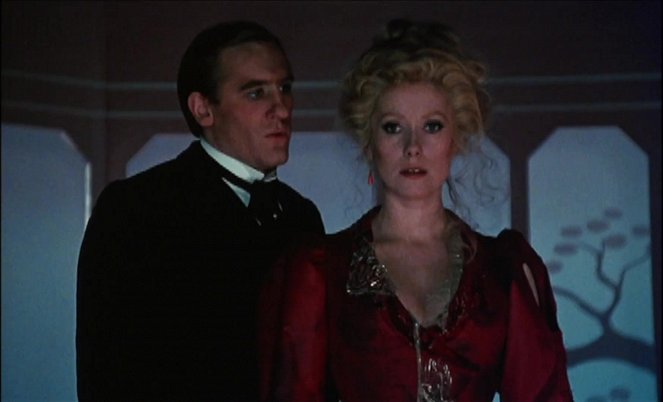Regie:
François TruffautKamera:
Néstor AlmendrosMusik:
Georges DelerueBesetzung:
Catherine Deneuve, Gérard Depardieu, Jean Poiret, Heinz Bennent, Andréa Ferréol, Jean-Louis Richard, Paulette Dubost, Alain Tasma, Richard Bohringer (mehr)Inhalte(1)
Der jüdische Regisseur Steiner versteckt sich im Keller seines Theaters vor den Nazis. Nur seine Frau Marion kennt das Versteck. Jeden Abend steigt sie hinab, erzählt von den Proben und dem Leben oben. Je länger Steiner sich verbergen muss, desto mehr verliert er den Bezug zur Realität und schon bald verliert er auch seine Frau Marion, die sich in den Darsteller Bernard verliebt. François Truffauts Besatzungsfilm ist alles andere als todernst. (Verleiher-Text)
(mehr)Kritiken (5)
A great film with excellent actors and the perfect atmosphere of a stage that mean the world. A dramas behind and on the stage during the occupation of Paris, when people went to the theatre or cinema to relax. For me personally, one of Truffaut best.
()
Although Truffaut surprises with subtle twists and a perfect ending, and turns Catherine Deneuve into a goddess of acting, it is precisely the acclaimed theatrical narrative that did not really appeal to me from the director's biography. Perhaps it is due to the surprise of the ambiguous mood and the feeling that François sometimes plays too much with the audience and does not take things seriously enough at key moments. The gentle satire thus undermines the story and the perfect overall comprehension somewhat falls flat.
()
The Last Metro is commercially the most successful Truffaut film popular with audiences, where a strong cast led by the mature and highly charming Catherine Deneuve and Gérard Depardieu, who was then full of energy, charismatic, and still new to the scene. Despite the undeniable directorial mastery and interesting occupation theme, I cannot give it a full rating because some motifs in the film simply didn't resonate with me. The functional part is the one that shows the world of the Paris theater, actors, and other theater personnel, while also depicting a love triangle between the main characters, where the husband, hiding from repression, helplessly watches the developing love affair between his wife and her acting partner. On the other hand, the broader depiction of the historical era of occupied France is not very functional, when two hundred policemen are searching for the main character and fail to realize that he is hiding in the basement of his theater. After getting leads of Steiner's presence in Paris, the Gestapo falls for the most banal trick at a time when executions and deportations were running rampant, and a wide network of informants and the Gestapo apparatus were doing efficient work. This trivialization and simplification of such a difficult period could be excused in a comedy, but not in a film of this genre. The most interesting moments are when the theater performances on the stage blend with the real lives of the film characters. A playful and professionally well-shot film. Overall impression: 85%.
()
We’ve heard similar opinions, but this film is too violently straddling several worlds and styles – between a simple theatrical play and a surrounding world full of Nazi menace and censorship, between a romantic drama and an innocent situational comedy – while beautifully and intimately depicting everything but nothing at the same time. Truffaut understands the craft like few others, but a sequence of impressively staged, lit and acted scenes, however original they may be together, are not enough for an unforgettable cinematic experience.
()
I don't have to love French films from the 60s completely, but if there is an author who stands out, it is undoubtedly François Truffaut, who proves with the film "The Last Metro" that he had an incredible sense for film and scenes, as well as an effort to come up with something new and interesting. Especially the ending of the film is absolutely brilliant. The connection of life, theater, and film could probably not be expressed better.
()

